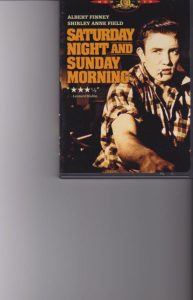A seminal British ‘kitchen sink’ drama which was the late Albert Finney’s first starring role. He plays Arthur Seaton, a rebellious factory worker who gets his married lover (played nuancedly and poignantly by Rachel Roberts) pregnant and then tries to help her deal with the crisis because of his feelings for her. He, meanwhile, becomes involved with a younger woman (played innocently by Shirley Anne Field) who brings him to the ‘precipice’ of marriage.
The realistic screenplay was adapted by the author Alan Sillitoe (of The Loneliness of the Long Distance Runner). He includes some very powerful scenes such as at the fair when Arthur and his pregnant lover are caught and punished by her husband and army mates, and even some gratuitous juvenile scenes such as when Arthur plugs a plump neighborhood ‘nosey parker’ in the butt with an air gun. There is that level of balance and contrast within the grubbiness and poverty of the characters’ lives depicted.
Sillitoe uses Arthur voiceover at the beginning, in the middle, and ending effectively, taking the viewer more inside Seaton’s head and reasoning. The director keeps the focus squarely on Arthur, though the minor characters are concisely delineated in the ways they contrast to him, notably the pregnant woman’s husband and Seaton’s fishing pal.
The accents at the beginning may throw off some North American viewers and there isn’t much to like or admire about most of the characters of Saturday Night and Sunday Morning, but it remains an honest motion picture that starkly (mostly through Freddie Francis’s black and white cinematography and John Dankworth’s folk and light jazz music)) captures and evokes the limited opportunities and small, pathetic lives of these frustrated characters existing in small-town Britain of the 1950s. And, if you’re a Finney fan, this role is a must-see in that veteran actor’s long, varied, and impressive career.

